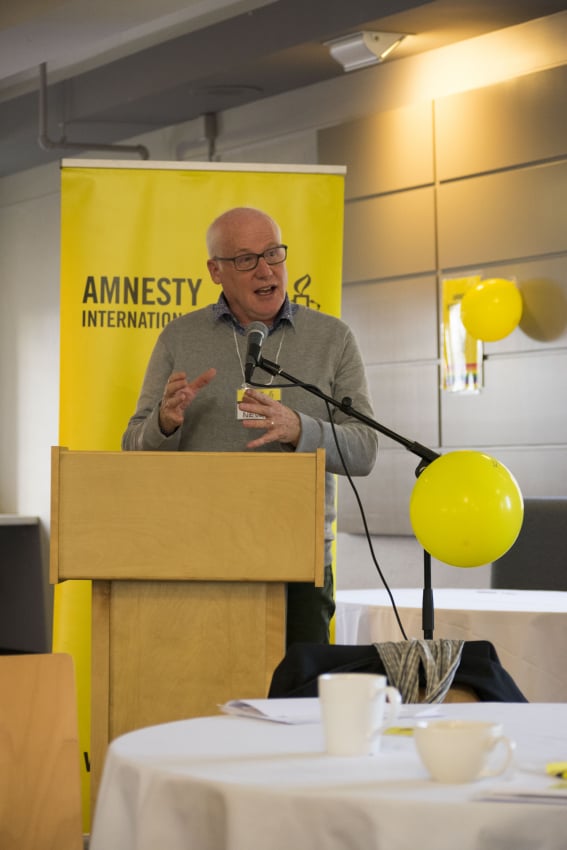
A regional forum hosted by Amnesty International educated students about corporate accountability in relation to human rights.
The event on Nov. 2 was kicked off by keynote speaker Alex Neve, a human rights activist and the secretary-general of Amnesty International Canada. To illustrate the impact of unethical business practices on communities around the world, Neve tells an anecdote from a frontline mission he was part of in Guinea.
“The words of one woman I interviewed on [that] mission have always stuck with me and have become my mantra,” Neve said. “She looked at me with very tired eyes, and said, ‘It’s all about the diamonds, everyone cares about the diamonds, and nobody cares about us.’”
Neve concluded his speech saying that “the relationship between human rights and the world of business is absolutely inextricably intertwined.”
Jacobi Herringer, an organizer of the conference and former president of Amnesty International at USask, wanted students to come away educated on human rights violations happening around the world and how to address them.
“We are not just educating and then leaving it to that. [As if it was], ‘Yeah, these are the atrocities going on in the world; go home now,’” Herringer said. “I feel like they can help in some way, rather than just know that it’s going on.”
Trisha Mae Junco, a second-year environmental engineering student from the University of Regina, attended the event in hopes of exploring human rights to help her navigate the ethics of her field.
“I want to explore rights as an engineering student,” Junco said. “For example, [in] manufacturing, I have to consider human rights [when] building a pipe or something like that.”
Although Amnesty is an international organization, the event talked about Canadian issues. Sheri Meyerhoffer, newly appointed as the first Canadian Ombudsperson for Responsible Enterprise, spoke about the controversies regarding her position. Her office works with the mandate to review alleged human rights abuses arising from Canadian companies working abroad.
Meyerhoffer was asked tough questions from the crowd, questioning her office’s reported lack of budget and power. She admits that there is still need for improvement, but she says that “where we are is better than we were before” she started her work in April.
One area Meyerhoffer pointed to was the amendments to remove the clause that allows for a company to make a complaint against a complainant.
“Those were all good amendments. But that is not where we stop or where we need to be,” Meyerhoffer said.
Neve says that Meyerhoffer’s appointment positions Canada as a global leader in human rights because her office is a fairly new idea in the field. However, he highlights the work that still needs to be done to make Canada’s global mining industry ethical.
“These mining companies lead the world and are present virtually everywhere and are backed up, here in Canada, by banks [and] law firms,” Neve said. “This is not only about human rights elsewhere; it deeply implicates us as a nation.”
The event was overall quite successful based on turnout, according to Herringer. However, she was disappointed with the number of students in attendance, since a stronger student turnout would have facilitated the group’s recruitment of new members.
“There’s a lot of people here, I think that most of the people here were already Amnesty supporters, but that’s not surprising,” Herringer said.
Considering that the event aimed to encourage student engagement in the field of human rights, Herringer says that though “there [were] students here, [she] would have liked to see more.”
—
Wardah Anwar
Photo: Aqsa Hussain/ Layout Manager
Leave a Reply